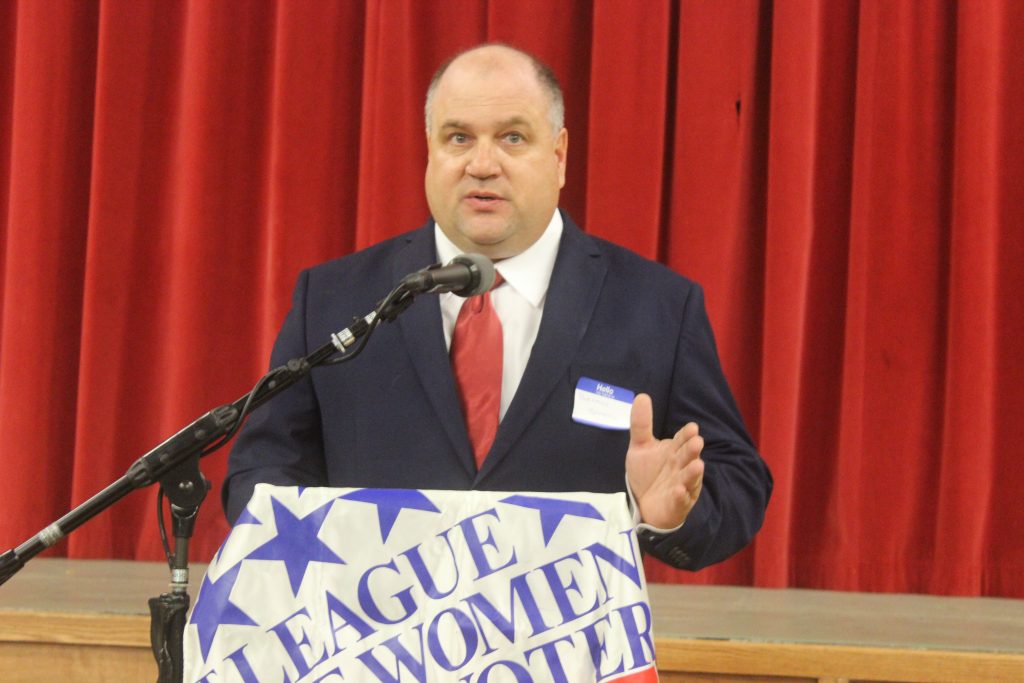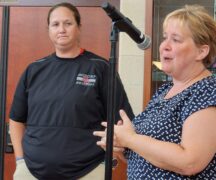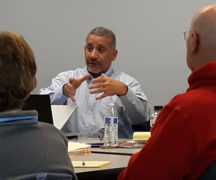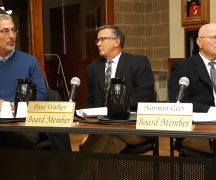By JAN LARSON McLAUGHLN
BG Independent News
The controversial race for Bowling Green Board of Education seats brought out a packed house Sunday evening for the League of Women Voters candidates night. In front of a standing-room only audience, seven candidates for three school board seats tried to convince voters that they were the best people for the job.
“This might be a record crowd,” league member Lee Hakel said as she looked over the audience.
(Four candidates for two Bowling Green City Council seats also participated. Their comments will appear in another story later on Monday.)
Each candidate was given 1 ½ minutes to answer questions, then two minutes for closing statements. One school board candidate, Ryan Myers was unable to attend due to a previous commitment.
The candidates included Jill Carr, a current board member who retired after 40 years in student affairs at BGSU; Grant Chamberlain, who has managed companies of various sizes and is working on his masters in accounting; Tracy Hovest, an educator for 20 years, who has a daughter at Conneaut Elementary; Brian Smith, who owns a family business; Ginny Stewart, the current board president, who previously worked at Phoenix Technologies and owned a downtown shop; Richard Strow, who lives on his family farm and is an agronomist at a grain elevator in Henry County; and Peggy Thompson, who recently retired after 32 years with Bowling Green City Schools, where she worked as a computer operator.
Following are the questions posed by the audience.
The first question asked whether or not the candidates supported the tax levy on the upcoming ballot for the building of one community elementary school.

Thompson said she was opposed to the levy.
“I feel it’s too much,” and not necessary, Thompson said. The three existing elementaries need maintenance, but don’t need to be replaced.
“The buildings are old, but not that old,” Thompson said of the elementaries, two which were constructed in the 1950s.
More important than the buildings is the need for more support for programs such as reading.
“We need to make sure we have adequate teachers and supplies,” she said.
Hovest said she supports the levy “absolutely, 110 percent.” She sees the new elementary as having a big economic development impact on the city.
Hovest attended more than 20 meetings of the community task forces coming up with a building plan for the district. “This is exactly what the committees suggested to the board,” she said. That includes splitting the tax between an income and property tax to make it more fair for the agricultural community, she added.
If the levy fails, Hovest said the district needs to somehow create more space for students – ideally not in portable modular units.
“We have got to somehow find room for students – but not in closets,” she said referring to the fact that some students now meet with teachers in former custodial closets. “We need to put our kids first.”
Smith said he is opposed to the levy.
“I think it’s too much,” he said. “I think it’s funded improperly.” Smith acknowledged that the school board changed the funding formula to generate half of the funding through property tax and the other half through income tax. “That’s not far enough,” he said.
Smith said the three existing elementaries have “good bones,” and have been neglected by the district. He suggested that the three elementaries and the high school be refurbished.
Smith also said the students may have to be redistricted to balance out the numbers in each elementary.
“We can repair what we have and offer our students the education they deserve,” he said.

Strow said he is “terribly torn” about the school levy. As a member of the financial task force, he voted for the income/property tax – but for three elementaries, not one elementary.
“Whether the issue passes or fails,” Strow said he would support the voters’ wishes if he is elected to the board.
If the levy fails, the board will need to prioritize repairs to the buildings – possibly using pipeline tax revenue for the maintenance, he said.
Carr is “100 percent” in support of the school issue. The board studied the data, listened to comments and came to the conclusion that a new community elementary is the best direction for the district, she said.
“We can no longer meet 21st century learning methodology in the current buildings,” Carr said.
“We can no longer have students sitting with teachers in hallways,” she said.
A new consolidated elementary would also provide a safer setting, with faster response times from first responders, she said.
“If the levy fails, we go back to the drawing board,” Carr said.
Chamberlain said he opposes the levy for a multitude of reasons.
“This issue has divided this community right down the middle,” resulting in neighbors being afraid to talk with each other, he said.
The existing buildings need to be repaired, he said.
Chamberlain said the answer to the problem rests with a transparent board of education.
Stewart said she “wholeheartedly” supports the bond issue. The current buildings just aren’t good enough, and the board is following the recommendation of the task forces, she added.
“This community needs to move forward and give kids and teachers the environment they deserve,” Stewart said.
If the levy fails, the board will go back to the public again for suggestions.
“We go back to square one,” Stewart said. “We are hurting our children every day and every week” this continues to go unresolved.
The candidates were next asked if the would support the hiring of a full-time licensed mental health professional after the recent loss of a student to suicide.

Stewart acknowledged the impact of the suicide. “It has really shaken this district to its core,” she said. The district has trained guidance counselors, but Stewart said she would support additional staff if it was shown that more was needed.
The district is looking at how to encourage students to be more forthcoming about their peers who are in distress.
“Our intervention specialists are well equipped to handle and manage our students,” she said.
Thompson talked about the issues faced by teens nowadays, with many being constantly on their cell phones or checking social media.
She suggested that parents should monitor their children’s social media usage, and limit time on cell phones. “Put things down, and talk to your kids,” she said.
Hovest said, as a teacher, she knows there is never enough mental health help in schools. Anxiety and depression issues are very common in teens, and can’t be adequately managed by teachers.
“We need to address these problems,” she said, adding that she is fully supportive of more mental health services.

Smith said he would support the hiring of one, if not more, mental health professionals. He suggested it needs to be a group effort between parents and teachers to monitor what students are doing.
Smith mentioned the pressures of being a teen, and the frequent bullying that takes place on social media.
“I believe we should provide all the resources possible,” he said.
Strow said he “absolutely” would support the hiring of a mental health professional. But he added that the district needs to work more with local agencies in the county that can offer services, such as the health department, alcohol and drug addiction board, and police division.
“We need to reach out and be part of a community to come up with a plan for this,” Strow said.
Carr said she would support the hiring of mental health personnel. She also mentioned existing coordinating efforts between school guidance counselors, teachers and administration.
Efforts are being made to offer more one-on-one time for students who want to talk about such issues, she said.
Chamberlain said he would support the hiring of such a person, but added, “there are plenty of resources available in this community that are drastically underutilized.”
The candidates were asked to describe their efforts in recent years to support the schools.

Chamberlain said he attends most school board meetings, participated on both task forces, and has made several public records requests of items that he felt needed to be more transparent.
Stewart, in addition to attending board meetings, sponsors the One Book BG program and theater productions, plus has helped coordinate school art and music performances for the city’s Interfaith Breakfast.
She also volunteers in a kindergarten classroom at Kenwood Elementary, “so I can see first-hand what our teachers go through,” Stewart said.
Thompson, who currently has nine grandchildren in local schools, said she supports their athletic efforts. When her children were in school, she participated in PTO and volunteered in the library. She currently participates in the Breakfast Buddy program at Crim Elementary.
Hovest said, in addition to attending school board meetings and serving on both task forces, she attends school athletic events, supports DECA and other organizations, and goes to school productions.
“I support our kids,” she said. “It’s about our students.”
Smith, who said he attends most board meetings, said he continues to support the district’s FFA program, even though his daughters are no longer in school.
Strow pointed out that as someone who attends board meetings, he requested that the meetings be moved from 5 p.m. to 6 p.m., to allow for more of the public to attend. The board compromised and now meets at 5:30 p.m. Strow was on the financial task force, and noted his volunteer efforts when his children were in school.
Carr, who serves on the board, said she used to serve as room mom, team mom, and helped with teacher recognition programs. She currently helps with the mock interview program for high school juniors.
“I have been a 40-year participant in the school district,” Carr said.
The next question asked about plans for refurbishing the three elementaries if the levy fails.

Carr said the board will have to come up with another plan – quickly.
“It will be absolutely essential to go back to the drawing board,” Carr said. “They are not going to go away. They are only going to get more expensive.”
Chamberlain said the solution is “easy.” He listed off the $700,000 in pipeline tax revenue the district received this year – that may be doubling next year when a second pipeline goes into service – plus the revenue the district has in the bank.
That money can be used to make repairs to the three elementaries. And the repairs could possibly be sped up if they are made over school breaks.
Stewart said the voters need to decide what is important to them.
“This community needs to take a good hard look at what our priorities are,” she said.
Stewart pointed out that the Ohio Facilities Construction Commission made the determination that two of the three elementaries are beyond refurbishing.
She also said the county auditor had cautioned the district about relying on money from the pipeline, since the companies often challenge their tax obligations.
“It would be foolhardy to think that will automatically be there every year,” Stewart said.
Thompson said if the levy fails, the district will need to examine its needs. She suggested better use of volunteers and one-on-one mentors. She also asked about the district’s budget surplus, and inquired if the board has plans to set aside maintenance money for a new building.
“Are we planning ahead,” Thompson said.

Hovest said the space problem will still exist if the levy fails.
“We cannot create space in these schools,” she said, echoing the fact that the OFCC determined that two of the existing elementary buildings were not worth refurbishing.
“As a community, I hope we will come together and see there is a need,” Hovest said. “Refurbishing is not an option. We need to rebuild.”
Smith suggested the space issue could be solved by adding onto the existing schools. “There is room to add on,” he said.
“If the community says ‘no,’ it will be the third time,” Smith said. The voters may be more likely to support a school issue if it is funded entirely by an earned income tax, rather than both a property and income tax, he said.
Strow said the $14 million in reserves is necessary because the district is supported by short-term levies. By approving longer terms, the voters could free up some of that $14 million, he said.
Strow also suggested the district search for more grant funding, and have a designated grant writer, “to take pressure off the taxpayers.”
The candidates were then given time for closing statements.
Thompson said her experience working with accounts payable for 32 years, and representing the union in contract negotiations gave her valuable experience that could benefit the board.
She believes in being financially transparent, the need to broaden the tax base, and the value of providing a strong foundation for students, noting that Crim and Kenwood are “not up to par with reading.”
Hovest said her experience as a teacher makes her “innately” qualified to make decisions that are best for kids.
“There are over 3,000 reasons this is personal – and they walk into the schools every single day,” she said.
Despite all the negativity about the school levy, Hovest said she is dedicated to “positively work in the interest of the students, the staff and the community.”
“We can choose to be part of the negativity and the problem,” she said. “I choose to be part of the solution.”
Smith said the district needs to fix the existing schools and “give the people what they voted for.”
“I see what the community has asked for – and it’s been denied twice now,” he said.
Strow said much is riding on the Nov. 5 election.
“We are unfortunately and sadly a divided community,” he said. “Our children are depending on us to heal these wounds.”
Strow pointed out that it has been more than 20 years since the board of education had a member from outside the city limits.
“I would provide a long needed diversity to the board,” he said.
Carr also noted the important task facing voters.
“I believe the BG community is at a turning point,” she said. The new elementary would not only be the best decision for students, but also would benefit the community by attracting new residents and new businesses.
The voters also face an important decision in electing school board members, Carr said. They should elect people “dedicated to the education and success of our children,” she said.
“I understand what is ahead of us,” and am willing to commit the time, Carr said.
Chamberlain said the voters have a clear choice – the current membership or “fresh ideas” with financial expertise, he said.
“It’s real simple,” he said. “We work for the taxpayers.”
Stewart said her priority is the students. The last four years on the board have been “a lesson in perseverance,” she said, adding, “I’m not done yet.”
“A community can only be as good as its schools,” she said. And a new school will allow the district to be competitive with other districts in the region.
Stewart talked about her volunteer work in the schools.
“My experience has left me wanting to do more,” she said. “I have shown my unwavering commitment to students.”





